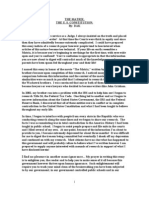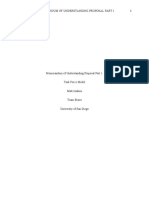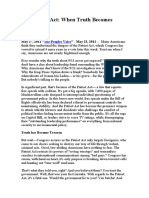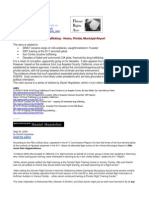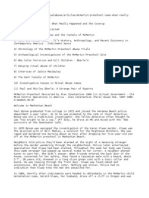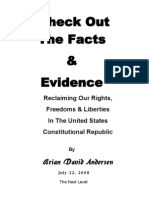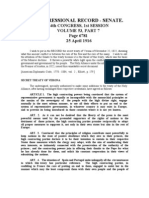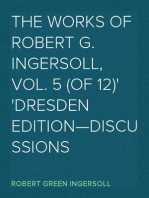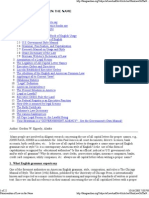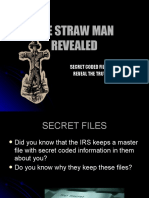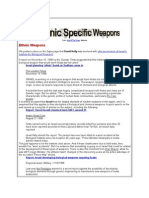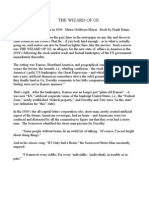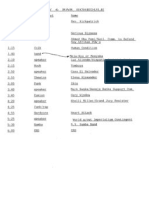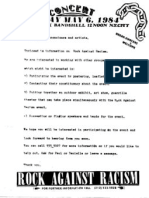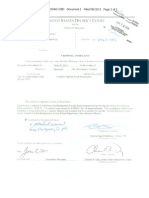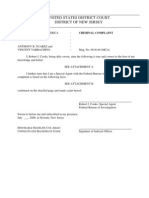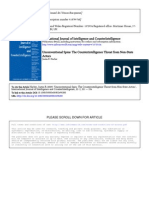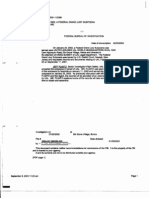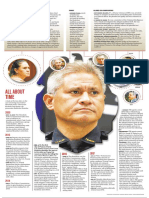America's Secret Court
America's Secret Court
Uploaded by
Paul DeRienzoCopyright:
Available Formats
America's Secret Court
America's Secret Court
Uploaded by
Paul DeRienzoOriginal Description:
Copyright
Available Formats
Share this document
Did you find this document useful?
Is this content inappropriate?
Copyright:
Available Formats
America's Secret Court
America's Secret Court
Uploaded by
Paul DeRienzoCopyright:
Available Formats
Pen ouse
June, 1999
America's Secret Court
By PAUL DERIENZO and JOAN MOOSSY,
5118 words
Second North American and all other rights available.
The Foreign Intelligence Surveillance Court deliberates in a vault-like room in the Dept. of Justice in DC. It issues no written opinions, and since 1978 has yet to turn down
even one of some 10,000 requests for wiretaps and search warrants.
First appeared in Penthouse. Updated September 23, 2001
Preface
The tragedy that struck the World Trade Center in New York City and the Pentagon, on the banks of the Potomac on September 11th happened without warning--and except
for the brave passengers on United Airlines flight 93--without resistance. How could the mightiest power on earth, the only global superpower, fall victim to a relatively
small group of conspirators? The answer may lie in the penchant for our counter intelligence folks to use racial, ethnic and cultural profiling to target their suspects.
Incidents of agents barking down a wrong tree while bad guys operate freely, plotting unspeakable acts of violence directly on US shores are all to common. The false
prosecution of nuclear scientist Wen Ho Lee, the failure to detect FBI counterintelligence Agent and traitor Robert Hanssen, and now the failure of intelligence agencies to
discover and stop the World Trade Center and Pentagon attackers. Although many pundits and officials have asked the public not to play the "blame game" this article
clearly demands that Americans demand immediate accountability over the lapses by the intelligence community that allowed these horrendous attacks. This article is the
story of one of the most important legal counterspy tools, the Foreign Intelligence Surveillance Act (FISA) and how although it was designed to limit governmental abuses
of power this law may be helping to create a police state. It's the story of how personal ambition and a lack of clear moral and ethical guidelines can put our most cherished
freedoms in peril.
--Paul DeRienzo and Joan Moossy NYC, September 23, 2001
Imagine a secret court made up of anonymous judges chosen by the Chief Justice of the United States and empowered to grant wiretaps, approve break-ins, bug
psychiatrists' offices and people's homes-all without probable cause that a crime has been or is being committed. Its hearings are conducted in secret, without notification of
the proposed targets and under a novel definition of due process that allows suspension of long-held civil rights in the name of national security. Once the subject of an
investigation is judged a "foreign power or agent of. a foreign power," a much lower standard than "probable cause," surveillance can begin and the targets cannot challenge
the evidence, answer the charges brought against them, or in many cases even know the surveillance has taken place. Such a secret court does in fact exist. It was created in
1978 under a law known as the Foreign Intelligence Surveillance Act, which was designed to limit the sort of abuses of authority committed by the administration of
President Richard M. Nixon and FBI Director J. Edgar Hoover. But according to many legal experts, FISA may in fact facilitate the creation of a police state. Even staunch
conservatives are troubled by this legislation. Yale Law School professor and former Supreme Court candidate Robert Bork has said that FISA would "not be the first
regulatory scheme that turned out to benefit the regulated rather than the public."
The roots of FISA lie in the social upheavals that convulsed the country in the 1960s and 70s. During that time, countless citizens were drawn into a plethora of political-
activist groups, from the civil-rights movement to anti-war organizations. Demonstrations and riots rocked cities and college campuses as Americans began to question
seriously the government's war in Vietnam. The federal government moved quickly to stanch the tide of opposition and social change through a program of dirty tricks and
unprecedented violations of personal rights and privacy, often justified as necessary for national security.
The government's abuse of the Constitution eventually reached its height with the Watergate break-in and subsequent scandal that resulted in the near-impeachment and
consequent resignation of President Nixon, who had ordered break-ins, known as black-bag jobs, against his Democratic opponents in the 1972 election. To defend his
actions, Nixon argued that the president has an "inherent authority" as chief executive to suspend the Constitution in an emergency. Abraham Lincoln had limited habeas-
corpus rights during the Civil War, and Franklin Roosevelt had interned thousands of Japanese-Americans in camps after Pearl Harbor.
Public outrage over Nixon's abuses led to a 1976 investigation by the Senate Select Committee on Intelligence. Testimony before the committee, which was headed by
Senator Frank Church of Idaho, revealed that the nation's intelligence agencies had consistently ignored and violated the Constitution for more than a quarter century.
Among other abuses, the FBI was held responsible for the infamous COINTELPRO counterintelligence program that targeted those whom Hoover and Nixon perceived as
political enemies: the Black Panther party, the American Indian Movement, and a host of popular leaders, including the Reverend Martin Luther King, Jr., and Malcolm X.
To Senator Church, all this was "one of the sordid episodes in the history of American law enforcement."
The findings of the Church Committee clearly established that there needed to be strict separation of federal law enforcement from the government's counterintelligence
activities. Ever since passage of the Omnibus Crime Control Act of 1968, electronic surveillance in criminal investigations has required a warrant signed by a judge. But the
'68 law had left open an exception in cases of national security - a loophole exploited by Nixon and his cronies. As designed ten years later, the primary purpose of FISA
was to gather counterintelligence information, not to make criminal prosecutions. Surveillance would be conducted under the guidance of the Justice Department,
employing a team of lawyers to work with the attorney general and the FBI An innovation proposed by then Attorney General Griffin Bell created a special court of sitting
federal judges who would approve FISA wiretaps the same way judges approve criminal wiretaps.
The main targets of FISA were supposed to be foreign intelligence agents working as part of their country's diplomatic missions in the United States. Although the U.S.
Supreme Court has yet to hear a FISA case, lower courts have ruled that "once surveillance becomes primarily a criminal investigation ... individual privacy interests come
to the fore and government foreign-policy concerns recede." Yet the fact that evidence acquired from a FISA surveillance can be used to make a criminal prosecution has led
some critics to charge that the FBI is taking advantage of the law to make arrests. Asserts American University law professor and Nation magazine commentator Herman
Schwartz, "FISA has not eliminated the incentive to use intelligence-gathering authority improperly to obtain evidence for criminal prosecutions."
A famous example of this impropriety is the case of former high-level CIA official Aldrich Ames, who was sentenced to life imprisonment in April 1994 for spying for the
Soviet Union. Although Ames eventually pled guilty to espionage, his lawyers say the government undermined the rights of all Americans, loyal or otherwise, in the way
they went after him. Prior to 1995, FISA specifically allowed national-security wiretaps but not searches without probable cause. The 17B.I., lacking enough evidence to
prove Ames had committed a crime but eager to catch him, went to then-Attorney General Janet Reno in October 1993 and convinced her to allow a search of Ames's home
without a warrant from a judge. It boils down to a sticky issue, since the most important right protected by the Fourth Amendment and enshrined in a thou sand years of
legal precedent is the right to be safe from a search in one's own home. Is it wrong for the government, even in the name of a legitimate national security investigation, to
violate the Constitution?
Ames's lawyer, Preston Burton shrugs off the disappointment of not having had the opportunity to argue the constitutionality of the search. "It would have presented some
very interesting legal issues that the courts have not clearly grappled with-and now they don't have to," he says, "because [Congress has] remedied the problem." Indeed,
within a year of Reno's action, Congress had amended FISA, permitting the Foreign Intelligence Surveillance Court to grant search warrants without probable cause.
President Bill Clinton broadened that power in February 1995 with an executive order allowing the attorney general and other top-level officials to approve physical
searches without a court order if the purpose is "to acquire foreign intelligence information." According to Burton, despite the real threat of spies and terrorists targeting the
U.S., "the argument that there is a national-security exception [to the Constitution] is a dangerous animal, because what that is hard to define."
The Foreign Intelligence Surveillance Court deliberates behind heavy, spyproof doors in a windowless, vault-like room in the headquarters of the Department of Justice. It
issues no written opinions, and since 1978 has yet to turn down even one of some 10,000 requests for wiretaps and search warrants. It's a frightening record, even to
dedicated Justice Department lawyers like Richard Scruggs, who examined FISA surveillance applications in 1995 and found that "there were so many FISAs being
conducted with so few attorneys that the review process to prevent factual and legal errors was virtually nonexistent."
Suspicions that COINTELPRO may not have been put out of business with the Church Committee hearings grew in the mid-1980s, after the FBI admitted it had paid
informants to spy on domestic political and religious groups associated with the Committee in Support of the People of El Salvador. Although the bureau was never directly
implicated in the campaign of dirty tricks launched against C.I.S.P.E.S., many began to see a familiar pattern of abuse. "Under the Clinton administration," Scruggs wrote in
his 1995 report to the Justice Department, "the nation's two systems for wiretapping-[Title 111] for criminal cases and [FISA] for intelligence gathering[have] become
freight trains running at full throttle down parallel tracks." Despite the collapse of the Soviet Union and the Communist bloc, FISA wiretap and search authorizations
increased dramatically, from 484 in 1992 to 839 in 1996, before leveling off at 749 in 1997 (Domestic criminal wiretaps increased from 340 to 569 in the same period.)
There are seven judges on the FISA court, appointed to staggered seven-year terms by the Chief Justice. Cases are brought by the attorney general acting for the FBI or any
other agency of the executive branch, including the super secret National Security Agency Hearings are held every two weeks, and in the event a warrant application is
turned down, the government can take its case to what has become known as the "Maytag repairmen" of the judicial system, the Foreign Intelligence Board of Review, a
court that Chief Justice William Rhenquist once remarked was "the easiest job you can have," because it never gets any appeals.
FISA judges have rarely discussed their work, but in recent years U.S. District Court Judge Royce Lamberth, the FISA court's presiding judge, has been offering his
opinions on that body's operations. A former prosecutor with a reputation for toughness and independence, Judge Lamberth was appointed to the federal district court by
President Ronald Reagan and to the FISA court by Rhenquist. Lamberth says the government's lawyers are doing a good job, and that the reason the government has never
lost a case before the court is that the Department of Justice has had a "superb internal review process ... through several different administrations."
According to Lamberth, each FISA application comes with the personal approval of the attorney general, "so we know there is political accountability for what is being
presented to us." In response to charges that the court has become a rubber stamp for prosecutors, Lamberth declares, "We could probably, if we wanted to play some games,
create denials and then re-applications and grant those and, you know, play numbers games. I don't think judges care about numbers games."
We will have to take Judge Lamberth at his word, because the public will never see the most recent congressional oversight probe into the workings of FISA. During the
104th Congress, the Senate Select Committee on Intelligence reviewed the government's policy on electronic surveillance and physical searches for national security
purposes. The committee traveled to key FBI field sites to study FISA in action, and tracked the FISA budget. Its review, the committee said, focused on issues of
"fundamental fairness toward targets of FISA." But the results of that report remain classified themselves, and its criticisms and recommendations will probably never be
made public.
According to Kate Martin, director of the Center for National Security Studies in Washington, D.C., the government "interprets the requirements under the law in a way that
leads to unconstitutional searches and seizures." Martin says that the FBI and Justice Department have "come to use FISA in situations where they intended from the
beginning to bring criminal charges against the target of a search." The problem, she says, is illustrated by the case of seven Palestinians and a Kenyan, the so-called Los
Angeles Eight. whom the government has been trying to deport for a decade because of their work with the radical Marxist organization the Popular Front for the Liberation
of Palestine. Martin says the basis for the FISA wiretap was solely "the First Amendment protected political activities, of the LA Eight." She notes that FISA "states
explicitly that the government cannot rely solely on First Amendment activities in initiating FISA wiretaps."
David Pugh, spokesperson for the National Coalition to Protect Political Freedom, says there have been 50 cases in the past six years in which the Immigration and
Naturalization Service has used secret evidence to arrest and deport non-citizens; all those cases, Pugh adds, involve Arabs and other Muslims. "The government is trying to
set both political and legal precedents in using secret evidence," says Pugh, "applying it to those they perceive as the most vulnerable sections of the population."
Following the terrorist bombings at the World Trade Center and in Oklahoma City, Congress passed the Anti-Terrorism and Effective Death Penalty Act of 1996. This
measure originally gave the federal government broad new powers to investigate and prosecute acts of domestic terrorism, but opposition from conservatives and, civil
libertarians alike resulted in the removal of most of its provisions dealing with American citizens. The act now targets non-citizens, borrowing features from FISA,
including provisions for secret evidence to be used in deportations and a secret Alien Terrorist Removal Court modeled after the FISA court.
That this law could serve as means of racial profiling by the government has always been a fear. A target of the anti-terrorism act is Nasser Ahmed, an Egyptian living in
Brooklyn for more then a decade. A husband and father who worked as an electrical engineer, he was arrested by the INS on the basis of secret evidence that neither he nor
his lawyers were allowed to see. Ahmed was held without being charged for three and a half years, mostly in solitary confinement, in a federal prison in New York City
until late 1999, when the government was ordered to release him by an immigration judge. Soon after more than two dozen others held in immigration jails on secret
evidence were also released. Ahmed maintained that the FBI was desperate to use him as an informant in the Muslim community where Agents admits they have few assets.
Abdeen Jabara, a lawyer who is on Ahmed's defense team contends that the anti-terrorism statute is "politically motivated and will be selectively enforced" against whatever
political movement the executive branch decides is the enemy at any given time.
Steven Aftergood, director of the Federation of American Scientists' Project on Government Secrecy, believes that FISA does have a role in protecting the country. "Do I
feel more threatened by the World Trade Center bombers and the Unabomber, or do I feel more threatened by Janet Reno?" he asks. "It's still the former, not the latter." But
Aftergood is also worried that the secrecy surrounding FISA may be endangering the rights of some of its targets.
Among those targets was a married couple sentenced earlier this year to long federal prison terms for conspiracy to commit espionage. Their case has raised concerns that
FISA might become a tool in the hands of zealots in law enforcement, as well as the troubling possibility that a law designed to prevent abuses of power may in fact
constitute an increasing threat to the rights of all Americans.
In February 1998, following a lengthy FISA-authorized investigation, Kurt Stand, Theresa Squillacote, and James Clark were indicted for conspiring to commit espionage
for the former German Democratic Republic, the Soviet Union, the Russian Federation, and the Republic of South Africa. The three had known one another since the early
1970s, when they were members of left-wing student organizations at the University of Wisconsin at Milwaukee.
Stand, was North American representative of the International Union of Food Workers, and Squillacote, his wife of more then 20 years and a former procurement lawyer for
the Pentagon, were charged with attempted espionage and obtaining national-defense information to be used to the injury of the United States. Squillacote was also charged
with violating an oath regarding the handling of classified material, taken upon her January 1997 resignation from the Pentagon. Clark, who was originally charged with
passing a top-secret CIA document to the Russians, pled guilty last spring, and in return for cooperating with the FBI received a relatively lenient sentence of 12 years and
seven months. Stand and Squillacote went to trial in October 1998, and were convicted on all charges. This past January they were sentenced: Stand to 17 and a half years,
Squillacote to nearly 22 years. Under federal sentencing guidelines, all three must serve at least 85 percent of their terms before release. The sentences were actually
considered relatively lenient, the shortest possible under sentencing guidelines. Defense lawyers had argued that since no actual damage had been done to the United States,
the judge should depart from the guidelines, but the prosecutors argued against more lenient sentences, citing the alleged duration of the conspiracy and the defendants' lack
of cooperation with authorities.
The government's indictment charged that Stand had been recruited as a spy in 1972 by an East German intelligence officer who was a friend of Stand's family, and that
several years later Stand brought Clark, at the time a graduate Student in Slavic languages, into the alleged conspiracy. Squillacote, the indictment claims, was recruited by
Stand around the time of their marriage in 1980. Their supporters scoff at the allegations, pointing out that if the government is right, Stand would have been 17 years old
when he began his alleged career as a spy in 1972.
The case against Stand, Squillacote, and Clark began when their names were discovered in files turned over to the CIA by high-ranking East German officials shortly before
the fall of East Germany in 1989. The documents contained the names of the citizens of the United States, Britain, and West Germany who had worked for the Orwellian
East German security agency known as the Stasi. For six years the CIA jealously fended off FBI agents hungry to make espionage cases in the United States, but in 1995 the
spooks were pressured into turning over to bureau agents some of the Stasi files. According to the FBI, it was "old-fashioned" detective work by a young German-speaking
agent named Katherine Alleman, formerly with Army Intelligence, that led to the discovery of cross-indexed "true name" cards identifying Stand, Squillacote, and Clark in
a Stasi file marked "Junior." Interestingly, Special Agent Alleman noted in her affidavit in support of search and arrest warrants that names in the files and the testimony of
former Stasi employees could be unreliable: "While these statements concern matters relevant to this investigation ... affiant cautions that she cannot vouch for the
truthfulness or accuracy of their contents."
Alleman brought her findings to the FISA court, and in 1996 the judges authorized the FBI to begin a 24-hour surveillance of Stand, Squillacote, and Clark, which lasted for
nearly two years, with renewals of the warrants approved every 90 days. The surveillance intruded into all aspects of their lives, including family, health, relationships,
finances, and professional work. Most seriously, the surveillance targeted conversations with Squillacote's psychiatrist, and a hidden microphone was placed in the couple's
bedroom to record their intimate conversations. With information acquired through the FISA surveillance, the FB.I. prepared a psychological portrait called a behavioral
analysis profile of Squillacote, identifying what they perceived to be her vulnerabilities.
In one of three FISA-authorized searches of the Stand-Squillacote residence, the FBI found a 1995 letter from Squillacote to South African Deputy Defense Minister and
Communist party leader Ronnie Kasrils. That stolen letter, which read like a philosophy major's term paper, became the basis of a government sting operation. The FBI
forged Kasrils's name on a letter delivered to Squillacote's post-office box-a letter purporting to be an invitation to meet a "special component" in order to "assist in our
struggle."
The first of four meetings between Squillacote and FBI Special Agent Douglas Gregory took place on October 12, 1996, at the Oak Bar in New York's Plaza Hotel, a
rendezvous featured in the Alfred Hitchcock spy movie North by Northwest. The behavioral profile had urged agents to "capitalize on her fantasies and intrigue, and the
initial meeting should ... leave his subject beguiled and craving more attention." Over drinks, Squillacote told Gregory that "I was kind of hoping he [Kasrils] would read
between the lines, and he did read between the lines. And that's why we're here." These were reckless, self-aggrandizing statements of hers that didn't even reflect the facts
of the case presented by prosecutors. Prepared by the behavioral profile, the FBI. agent continued to feed her curiosity, telling Squillacote that the unclassified political
reports she offered were inadequate and that South Africa wanted "scoops" and had "needs to be filled on a practical basis."
Squillacote was hooked, and during the next meeting, on January 5, 1997, she handed Gregory four documents. Three of them were planning guides from the Defense
Department, the fourth was a CIA International Arms Trade Report. The DOD documents included plans dealing with potential threats from currently friendly countries; the
CIA paper contained a report on bribery in the international arms market.
Squillacote wasn't arrested at the time, and Gregory, still posing as a South African, met again with her. This time she was accompanied by Stand and their two children.
The rendezvous was at a popular tourist restaurant in Atlanta, where the kids ate ice cream while the adults had drinks.
A few weeks later a separate "false flag" FBI operation targeted Clark with an agent posing as a Russian spy. The sudden meeting with the phony Russian set off Clark's
internal alarms, and he got in touch with Squillacote. The two discussed the possibility of an FBI setup, but Squillacote continued to believe Gregory was a South African,
and even broached the subject of a phony passport so she could make a clandestine visit to South Africa.
The government ended its surveillance of Squillacote and Stand in May 1997, but she continued to write to Gregory. On October 4, 1997, a meeting was set up at the Hyatt
Hotel in Roslyn, Virginia, across the Potomac from Washington. While Stand drove around looking for a parking space, Squillacote entered the hotel, where she was
quickly arrested. When Stand went into the hotel after parking the car, FBI agents were waiting for him. Clark was arrested the same day, and two weeks later the three were
denied bail.
The arrests of "the last three Communists in America" made headlines in South Africa after The Washington Post reported that the "false flag" operation had been carried
out with the cooperation of the South African government. A few days later Kasrils demanded and received from then FBI Director Louis Freeh an apology from the United
States government for implying Kasrils had cooperated with the sting.
During the trial, defense lawyers argued that much of the information in the various documents was in the public domain and had been released at congressional hearings, in
Janes Defense Weekly, and leaked to newspapers. The prosecutors, not to be outdone, gave jurors edited copies of the purloined documents in binders emblazoned with the
word "secret" in bright red on the front and back. The government bolstered its contention that the documents were indeed secret with testimony from two security officers,
William H. McNair of the CIA and, from the Pentagon, Admiral Dennis Blair, former associate director of Central Intelligence for Military Support. McNair forced a halt to
the proceeding when he refused to read a passage from Janes Defense Weekly, claiming national security.
Although some observers snickered as McNair struggled to avoid admitting that the so-called classified information was publicly available, Steven Aftergood observes that
officials have wide powers to classify information and "the fact that certain information appears in the public media does not automatically render it unclassified in the eyes
of the government." This in turn creates a dangerous paradox, the secrecy watchdog says, because "the government's national-security system has expanded beyond all
reasonable bounds." Harvard University law professor Alan Dershowitz, who represented Jonathan Pollard, an American sentenced to life imprisonment for spying for
Israel, angrily insists that the government "can't use classification as a shield and a sword."
Stand and Squillacote's case was set for trial before Federal District Court Judge Claude M. Hilton in the Eastern District of Virginia, the so-called rocket docket, where
conservative judges and juries are famous for making short work of defendants in speedy trials. The couple's supporters maintain that the government went "venue
shopping," and that the arrests were made in Virginia in order to avoid a liberal jury in the District of Columbia. In fact several of the Virginia jury members had ties to
national-security interests, which is unavoidable in that jurisdiction.
Judge Hilton refused to suppress evidence collected during a six-day search of the couple's residence conducted after the arrests and after three secret searches authorized by
the FISA court. Hilton also ruled the extensive taps of their conversations were legally authorized, and rejected a bid for a "taint hearing" sought by defense lawyers, who
argued that the FBI wiretaps collected information protected by psychotherapy and marital privileges.
The trial began on October 9, 1998 Clark, who had pled guilty months earlier, testified for the prosecution as to Stand's and Squillacote's relationship with their East German
handler. Clark said he had passed secret documents to the same man in the 1970s and eighties, but that neither Stand nor Squillacote had ever told him they gave the East
German classified information.
Defense attorneys pointed out that prior to the FBI's 1996 sting operation against Stand and Squillacote, 200 agents had uncovered nothing of a criminal nature in Stand and
Squillacote's behavior despite taping their every phone call, bugging their home and searching through their home and trash. Aside from what Squillacote had given to FBI
Special Agent Gregory during the sting, there was no evidence of any classified documents having been passed to foreign agents.
Defense lawyers further maintained that the feds had launched a sting operation against Squillacote because they deemed her to be vulnerable as a result of their behavioral -
analysis-profile report, and played on her vulnerabilities, leading her into breaking the law. Squillacote's attorney, Lawrence Robbins, questioned Special Agent Gregory,
who revealed that the FBI had researched Squillacote's family history of depression and suicide and her dependence on psychiatric drugs. Gregory admitted that he had
carefully cultivated the spy relationship, timing the moves on the basis of Squillacote's mood swings. Although the possibility that the sting operation might result in
Squillacote's suicide had been discussed by the FBI agents, they decided to proceed with the operation.
Attorneys for Stand and Squillacote are particularly bitter about the secrecy shrouding the affidavit filed by the FBI in support of its request for wiretap and search warrants.
A routine request for disclosure in most criminal cases, seeing and directly challenging a governmental request for surveillance, has never been allowed in a FISA case. This
secrecy, claims Squillacote's co-counsel Lee Rubin, is an "overreaction, to the detriment of the accused," that leaves defense lawyers in the position of "litigating in the
dark" and having to "assume what's in the government's affidavit." Rubin says his client's appeal will be "based on the facts that in 1996," when the surveillance of Stand
and Squillacote began, "there wasn't sufficient evidence to obtain a FISA authorization" because East Germany had ceased to exist.
There remains the matter of the alleged spying on behalf of South Africa, a country that does exist and maintains friendly relations with the United States. In his closing
argument before the jury, prosecutor Randy Bellows noted that it is not just foreign enemies that have an interest in the vicissitudes of United States foreign policy. Alluding
to South African President 'Nelson Mandela, Bellows declared, "It doesn't matter whether a country is run by a saint, it's still espionage. It does not matter if a country is
friend or foe." For his part, Squillacote lawyer Robbins argued that the couple's case "cannot possibly be compared" to the case of Jonathan Pollard, who spied for a friendly
nation, Israel, and was sentenced to life in prison. Stand's lawyer, Richard Sauber, said his client's actions were "hardly real espionage activity."
Unwittingly, Bellows had touched upon the frightening potential for increasing FISA abuses. In a post Cold War world, where the rapid integration of a global economy is
proceeding apace and tensions between former great powers have been replaced by a multiplicity of struggles throughout the developing world, the distinction between
friend and foe is becoming harder to make. As more Americans become involved in the business and affairs of nations from time to time seemingly at odds with U.S.
foreign and economic policy, they may find themselves targets of surveillance. The alarm has been sounded before. In 1978, when FISA passed into law, an editorial in The
New Republic warned, "The vagueness of the requirement under FISA that the target of surveillance be a foreign power or agent of a foreign power invites abuses....
Conceivably, it could include any American with a commercial, educational, or personal relationship with a foreign person or organization."
In other words, the next target could be you.
In the days following the September 11th, 2001 attack on the WTC and Pentagon the United States Congress began debating a new law legalizing so-called "roving
wiretaps."
Return to...
Let 'em Talk | NWO.MEDIA
You might also like
- The Dark Alliance, Gary WebbDocument109 pagesThe Dark Alliance, Gary WebbAlexander Price100% (9)
- Diversified Metal Products The IRS Is Not A Government AgencyDocument9 pagesDiversified Metal Products The IRS Is Not A Government AgencyHorsetail Goatsfoot100% (1)
- The Matrix and The U. S. Constitution by DAKDocument42 pagesThe Matrix and The U. S. Constitution by DAKJimHom100% (8)
- Cia Skulls Bones Aka Black BouleDocument7 pagesCia Skulls Bones Aka Black BouleWillie Johnson100% (2)
- Judgment: in The Matter of The United States of America, Claimants' vs. Bill Gates, MelindaDocument8 pagesJudgment: in The Matter of The United States of America, Claimants' vs. Bill Gates, MelindaAlfereen PereerNo ratings yet
- Treason in AmericaDocument334 pagesTreason in Americavigilancio153100% (4)
- TL01 Behold Terra LibraDocument15 pagesTL01 Behold Terra LibraKeyProphet100% (1)
- Snowden HaarpDocument3 pagesSnowden HaarpStarLink1No ratings yet
- Task Force ModelDocument6 pagesTask Force Modelapi-436793538No ratings yet
- "The Patriot Act: When Truth Becomes Treason", Susan LindauerDocument5 pages"The Patriot Act: When Truth Becomes Treason", Susan LindauerGiuliano ValverdeNo ratings yet
- Illumanti SitesDocument4 pagesIllumanti SitesSamad IslamNo ratings yet
- NDAA Does Apply To AmericansDocument14 pagesNDAA Does Apply To Americansjack007xrayNo ratings yet
- False Flag TerrorismDocument16 pagesFalse Flag Terrorismjack007xrayNo ratings yet
- Globalist Letter To The SheepleDocument11 pagesGlobalist Letter To The SheepleSheri100% (2)
- 72 Types of Americans That Are Considered Terrorists - SnyderDocument5 pages72 Types of Americans That Are Considered Terrorists - SnyderPRMurphy100% (2)
- Bush Exec Order 13470 30jul08Document40 pagesBush Exec Order 13470 30jul08Guy RazerNo ratings yet
- 09-09-24 More On CIA Drug Trafficking - Venice, Florida, Municipal AirportDocument5 pages09-09-24 More On CIA Drug Trafficking - Venice, Florida, Municipal AirportHuman Rights Alert - NGO (RA)No ratings yet
- Police Corruption - ReportDocument18 pagesPolice Corruption - ReportMarium KhalidNo ratings yet
- Total Population ControlDocument14 pagesTotal Population ControlTomGambill100% (1)
- State Secret Privilege Freedom Info Privacy and Transparency ActDocument19 pagesState Secret Privilege Freedom Info Privacy and Transparency ActFrank GallagherNo ratings yet
- A Timeline of CIA AtrocitiesDocument18 pagesA Timeline of CIA AtrocitiesShaunda JohnNo ratings yet
- Clowns FrontDocument19 pagesClowns FrontAsp100% (1)
- The End Game HoaxDocument13 pagesThe End Game HoaxDonates AweNo ratings yet
- JFK vs. The FedDocument5 pagesJFK vs. The Fedfabrignani@yahoo.comNo ratings yet
- Cia NocDocument1,299 pagesCia NocglennallynNo ratings yet
- McMartin Preschool Case What Really Happened and The CoverupDocument53 pagesMcMartin Preschool Case What Really Happened and The CoverupALBINOCYCLOPSNo ratings yet
- Alias Disrupt & Discredit (D&D) or Vigorous HarassmentDocument13 pagesAlias Disrupt & Discredit (D&D) or Vigorous HarassmentRoberto Abraham ScaruffiNo ratings yet
- Facts and EvidenceDocument64 pagesFacts and Evidencejbeing1100% (6)
- Louis T McFaddenDocument18 pagesLouis T McFaddenanon-718138100% (1)
- Real X-Files Hidden As Trade SecretsDocument3 pagesReal X-Files Hidden As Trade Secretsmysticdream0% (1)
- Congressional Record (Secret Treaty of Verona)Document4 pagesCongressional Record (Secret Treaty of Verona)Ali El100% (1)
- Revealing The Impotence of The Black Nobility at The Center of The Banking CartelDocument6 pagesRevealing The Impotence of The Black Nobility at The Center of The Banking CartelAnonymous CdKFSJPGFNo ratings yet
- The Works of Robert G. Ingersoll, Vol. 5 (of 12) Dresden Edition—DiscussionsFrom EverandThe Works of Robert G. Ingersoll, Vol. 5 (of 12) Dresden Edition—DiscussionsNo ratings yet
- Gang Stalking Network Belgique VideoDocument10 pagesGang Stalking Network Belgique VideoSimon BenjaminNo ratings yet
- Treason Complaint Satanism Disguised As Eugenics, Assassination Programming, Artificial Laws/Respirators Artificial Dead!Document173 pagesTreason Complaint Satanism Disguised As Eugenics, Assassination Programming, Artificial Laws/Respirators Artificial Dead!Miriam Snyder100% (2)
- Secret Law and The Threat To Democratic and Accountable Government-S. HRG. 110-604Document179 pagesSecret Law and The Threat To Democratic and Accountable Government-S. HRG. 110-604RodNo ratings yet
- The Legalities of All-Capital-Letters Names (Your Drivers License)Document22 pagesThe Legalities of All-Capital-Letters Names (Your Drivers License)Schnooze88% (25)
- Real Drug Lords - A Brief History of CIA Involvement in The Drug Trade by William Blum August 31, 2008 Revolutionradio - Org-3Document3 pagesReal Drug Lords - A Brief History of CIA Involvement in The Drug Trade by William Blum August 31, 2008 Revolutionradio - Org-3Keith KnightNo ratings yet
- The Dark AllianceDocument55 pagesThe Dark AllianceKamau Hwood100% (3)
- 060 News Reports About Gangstalking and Electronic TortureDocument3 pages060 News Reports About Gangstalking and Electronic TortureGeneration GenerationNo ratings yet
- Targeted Individuals - 2nd Level CIA MIND CONTROLLING YOU-Press Release - WARNINGS To "We The People" - ThewhiteroseiiDocument14 pagesTargeted Individuals - 2nd Level CIA MIND CONTROLLING YOU-Press Release - WARNINGS To "We The People" - ThewhiteroseiiGustav-Schneeclaus100% (2)
- Clintons, Mena, CIA, Guns & Cocaine-28Document28 pagesClintons, Mena, CIA, Guns & Cocaine-28Keith Knight100% (1)
- List of Faked History EventsDocument9 pagesList of Faked History EventsBrian Davis100% (1)
- Upon Release of Martial Law Documents The Plan For America's Destruction Becomes ApparentDocument5 pagesUpon Release of Martial Law Documents The Plan For America's Destruction Becomes Apparentjack007xrayNo ratings yet
- The Straw Man RevealedDocument64 pagesThe Straw Man Revealedrhouse_1No ratings yet
- TE OutlineDocument113 pagesTE OutlineJavier RosadoNo ratings yet
- Use of Pro SeDocument6 pagesUse of Pro SeMin Hotep Tzaddik BeyNo ratings yet
- Ethnic Specific WeaponsDocument17 pagesEthnic Specific WeaponsJoao JoseNo ratings yet
- Why Moors DO NOT Petition and Cannot BeDocument1 pageWhy Moors DO NOT Petition and Cannot BeWen' George BeyNo ratings yet
- Invisible GovernmentDocument5 pagesInvisible GovernmentBZ RigerNo ratings yet
- COPY AND PASTE THIS HTTPS://WWW - scribd.com/document/433757616/7-I-Found-What-Ronald-Morin-Refused-to-Comment-on-Remember-That-Audio-Recording-by-Shawn-Which-I-Took-the-Liberty-to-Make-Known-J-MDocument33 pagesCOPY AND PASTE THIS HTTPS://WWW - scribd.com/document/433757616/7-I-Found-What-Ronald-Morin-Refused-to-Comment-on-Remember-That-Audio-Recording-by-Shawn-Which-I-Took-the-Liberty-to-Make-Known-J-MShawn CullenNo ratings yet
- Forensic LinguistikDocument10 pagesForensic LinguistikAyu Merta WidariNo ratings yet
- Artificial Intelligence and Human RightsDocument207 pagesArtificial Intelligence and Human RightsHopeful FaithfulNo ratings yet
- Houston Federal Criminal Lawyer: Powerful Defense Against Federal Conspiracy ChargesDocument13 pagesHouston Federal Criminal Lawyer: Powerful Defense Against Federal Conspiracy Chargesalanlloydbuo100% (1)
- A Company Family - The Untold History of Obama and The CIA - CovertAction MagazineDocument36 pagesA Company Family - The Untold History of Obama and The CIA - CovertAction MagazineTdaleNo ratings yet
- Wizard of Oz - A Kids Story Haw... HMM!Document4 pagesWizard of Oz - A Kids Story Haw... HMM!smo-kay100% (4)
- DeBour - Close Encounters of The Police & Citizens 2017Document158 pagesDeBour - Close Encounters of The Police & Citizens 2017iX i0No ratings yet
- George H Scherf JRDocument43 pagesGeorge H Scherf JRbammer1100% (2)
- Motion To Supress Complete District CourtDocument15 pagesMotion To Supress Complete District CourtMissy Duncan100% (1)
- How To Disappear Erase Your Digital Footprint Leave False Trails and Vanish Without A TraceDocument5 pagesHow To Disappear Erase Your Digital Footprint Leave False Trails and Vanish Without A Tracereaper0belial0No ratings yet
- PRISM Exposed - US SPYING Through Worldwide Data SurveillanceDocument5 pagesPRISM Exposed - US SPYING Through Worldwide Data SurveillanceFlorence TanNo ratings yet
- RAR Schedule May6Document1 pageRAR Schedule May6Paul DeRienzoNo ratings yet
- 2009 Inquiry TeamDocument12 pages2009 Inquiry TeamPaul DeRienzoNo ratings yet
- Rock Against Reagan 1984Document1 pageRock Against Reagan 1984Paul DeRienzoNo ratings yet
- RAR Press Release OriginalDocument1 pageRAR Press Release OriginalPaul DeRienzoNo ratings yet
- RARbenefit HunterDocument1 pageRARbenefit HunterPaul DeRienzoNo ratings yet
- RARbreakdancerswanted May 6Document1 pageRARbreakdancerswanted May 6Paul DeRienzoNo ratings yet
- Potmarch RAR1987Document1 pagePotmarch RAR1987Paul DeRienzoNo ratings yet
- Bandshelldisputeto SCOTUS89Document1 pageBandshelldisputeto SCOTUS89Paul DeRienzoNo ratings yet
- Pump - Up The Volume Articles 89Document1 pagePump - Up The Volume Articles 89Paul DeRienzoNo ratings yet
- 2021-03-25 CEG RHJ To USSS (Hunter Biden Weapon)Document2 pages2021-03-25 CEG RHJ To USSS (Hunter Biden Weapon)Fox NewsNo ratings yet
- BCISS Conference Materials - Understanding and Improving Intelligence AnalysisDocument22 pagesBCISS Conference Materials - Understanding and Improving Intelligence AnalysisStephen MarrinNo ratings yet
- Complaint Affidavit: Jorge Rueda LanderosDocument5 pagesComplaint Affidavit: Jorge Rueda LanderosWAMU885newsNo ratings yet
- Chapter 8b - The Bay of Pigs and The Kennedy Assassination TARPLEYDocument8 pagesChapter 8b - The Bay of Pigs and The Kennedy Assassination TARPLEYvolvarosNo ratings yet
- Personal Statement Fbi 2021 1Document1 pagePersonal Statement Fbi 2021 1api-555104922No ratings yet
- J Edgar Hoover 1895-1972Document26 pagesJ Edgar Hoover 1895-1972tkunzNo ratings yet
- The Science of FingerprintsDocument143 pagesThe Science of FingerprintsNatalia GomezNo ratings yet
- FBI Law Enforcement Bulletin - Jan03lebDocument35 pagesFBI Law Enforcement Bulletin - Jan03lebFBI Law Enforcement BulletinNo ratings yet
- Doe V US - OPINION AND ORDERDocument33 pagesDoe V US - OPINION AND ORDERTechno Fog100% (1)
- Edward Andrews ComplaintDocument4 pagesEdward Andrews ComplaintEmily BabayNo ratings yet
- FBI Military Gangs 2007 PDFDocument2 pagesFBI Military Gangs 2007 PDFChrisNo ratings yet
- United States District Court District of New Jersey: Criminal ComplaintDocument12 pagesUnited States District Court District of New Jersey: Criminal ComplaintSHIFrankel100% (2)
- Kerry Wayne Persick ComplaintDocument5 pagesKerry Wayne Persick ComplaintLaw&CrimeNo ratings yet
- United States v. Stefano Magaddino, 496 F.2d 455, 2d Cir. (1974)Document9 pagesUnited States v. Stefano Magaddino, 496 F.2d 455, 2d Cir. (1974)Scribd Government DocsNo ratings yet
- Judicial Conduct Board COMPLAINT Re MJ-02101-TR-0001855-2017 FAILURE TO TURN MDJ ADAM J. WIDTKONIS of July 17, 2017 PDFDocument31 pagesJudicial Conduct Board COMPLAINT Re MJ-02101-TR-0001855-2017 FAILURE TO TURN MDJ ADAM J. WIDTKONIS of July 17, 2017 PDFStan J. Caterbone100% (2)
- The Counterintelligence Threat From Non State ActorsDocument17 pagesThe Counterintelligence Threat From Non State ActorsvinumentisNo ratings yet
- FISA Scandal SummaryDocument2 pagesFISA Scandal SummaryAnonymous RaZnhY75% (4)
- Angelo Bruno FBI FilesDocument76 pagesAngelo Bruno FBI FilesAlan Jules Weberman100% (1)
- T7 B10 FBI 302s Olsen FDR - 2 302s Re Jeff Plantz Re UAL 93 Wreckage and Subpoenaed Docs 367Document2 pagesT7 B10 FBI 302s Olsen FDR - 2 302s Re Jeff Plantz Re UAL 93 Wreckage and Subpoenaed Docs 3679/11 Document ArchiveNo ratings yet
- CDI ReviewerDocument233 pagesCDI ReviewerRc Del rosarioNo ratings yet
- Christopher Quaglin AffidavitDocument26 pagesChristopher Quaglin AffidavitKristen Faith SchneiderNo ratings yet
- Application and Affidavit For Search WarrantDocument37 pagesApplication and Affidavit For Search WarrantDerek J McKnightNo ratings yet
- The Story of The CIA's "Finders" Abduction OperationDocument15 pagesThe Story of The CIA's "Finders" Abduction OperationSolomanTrismosin75% (4)
- CPNI Certification Filing - EB Docket No 06-36 For Filer ID 803703 2013 For 2012Document7 pagesCPNI Certification Filing - EB Docket No 06-36 For Filer ID 803703 2013 For 2012Federal Communications Commission (FCC)No ratings yet
- Sheffler Hedden BantaDocument15 pagesSheffler Hedden BantaKHQA News100% (1)
- Frauds PDFDocument35 pagesFrauds PDFRaissa Ericka RomanNo ratings yet
- The Kealoha Case: Key Players & Key DatesDocument1 pageThe Kealoha Case: Key Players & Key DatesHonolulu Star-Advertiser100% (2)
- Gohmert Mueller UNMASKEDDocument48 pagesGohmert Mueller UNMASKEDTrue Pundit90% (78)
- Criminal Complaint in Flight Sexual AssaultDocument7 pagesCriminal Complaint in Flight Sexual AssaultFOX40 NewsNo ratings yet


